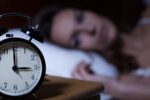The Alcohol-Sleep Trap: Why That Nightcap Doesn’t Help
It’s a familiar scene: you’ve had a stressful day, and a drink feels like the quickest way to switch off. That first sip brings a sense of warmth and calm. By the time you climb into bed, you might even fall asleep faster. No wonder alcohol has earned a reputation as a “nightcap.” But here’s the truth: while alcohol can help you drift off, it almost always robs you of the deep, restorative sleep your body really needs.
If you’ve ever woken up at 3 a.m. with your mind racing, or felt groggy despite “sleeping all night,” alcohol may be playing a bigger role than you realise.
Why alcohol and sleep don’t mix
Alcohol is a sedative, but it doesn’t create natural sleep. Instead, it suppresses the body’s natural rhythm and disrupts deep rest. The NHS explains that while alcohol may help some people fall asleep more quickly, it interferes with sleep patterns and prevents the body from sleeping deeply — leaving you tired and unrefreshed the next day. Even moderate drinking can cause:
- Frequent awakenings through the night
- Increased bathroom trips as alcohol acts as a diuretic
- Night sweats and restlessness that break deep sleep cycles
- Daytime fatigue, irritability, and reduced concentration
In short: alcohol doesn’t help you sleep — it only tricks your body into thinking it has.
Why alcohol fragments your sleep
Alcohol is metabolised quickly by the body. Once its sedative effect wears off, your nervous system can rebound into a more stimulated state. That’s why many people wake up around 3 or 4 a.m. — just when their body is processing the alcohol. This “rebound alertness” leaves you tossing and turning, even if you fell asleep easily at first.
Research also shows that alcohol suppresses REM sleep early in the night, then causes an increase in lighter, more restless stages later on. This means you may spend eight hours in bed but still feel like you’ve barely rested. Over time, this lack of deep sleep can affect memory, concentration, immune function, and emotional resilience — the very qualities you need most when life feels stressful.
Introducing Ailsa Frank
This is where the work of British hypnotherapist Ailsa Frank becomes so valuable. For more than 20 years, Ailsa has helped people reduce alcohol intake, improve sleep, and create healthier habits through her one-to-one sessions and the Feel Amazing App. Her gentle, practical approach is designed to rewire the subconscious mind, helping people make changes that feel natural and lasting.
The emotional toll of broken sleep
When you’re already dealing with stress, anxiety, or busy days, poor sleep makes everything feel worse. Irritability rises, resilience drops, and even small challenges can feel overwhelming. This is why alcohol often becomes a cycle: you drink to fall asleep, wake tired, and then feel tempted to drink again the next night to “make up for it.”
Over time, the nightcap that was supposed to help you cope can become the very reason you feel drained. Many people don’t realise just how much of their daytime mood, focus, and energy is tied to the quality of their sleep.
“The glass of wine often masks the real issue”
Hypnotherapist Ailsa Frank has worked with countless people who believed alcohol was helping them sleep. She explains:
“The glass of wine at night often feels like it’s relaxing you, but it’s masking the real issue. Alcohol fragments your sleep so you never reach the deep rest your mind and body crave. With hypnotherapy, people often discover they can relax and sleep more deeply without needing a drink at all.”
How hypnotherapy helps reset sleep patterns
Hypnotherapy works by calming the nervous system and guiding the subconscious mind into healthier patterns. Instead of relying on alcohol as a shortcut, hypnotherapy teaches the mind to relax naturally — helping you drift into sleep without disturbance.
Here’s how it can help:
- Encourages deeper relaxation – replacing the “false calm” of alcohol with genuine rest.
- Soothes anxious thoughts – so you don’t lie awake replaying worries.
- Strengthens sleep cues – teaching the body to associate bedtime with calm, not with wine.
- Breaks the habit loop – reducing the automatic urge to pour a drink as part of the evening routine.
A 2024 peer-reviewed review in Brain Sciences (via PubMed Central) found that hypnosis consistently reduces stress-related sympathetic arousal and enhances parasympathetic activity — the body’s natural “rest and digest” state. This shift supports deeper relaxation and the internal conditions needed for restorative sleep.
Why hypnotherapy recordings are effective
The Feel Amazing App offers recordings you can listen to in bed or in the evening as part of winding down. Unlike alcohol, which knocks you into shallow sleep, these recordings guide your subconscious into patterns that support real rest.
With hypnotherapy, consistency is everything. Listening daily creates small but important changes in how your subconscious reacts to bedtime. For example:
- First week – you may notice falling asleep more calmly, even if you still wake during the night.
- Weeks two to three – the urge for a drink before bed often begins to lessen.
- After a month – many people find their sleep feels deeper, they wake less, and mornings are easier.
Because the recordings are short, they fit easily into an evening routine. Over time, they become a signal to the mind: this is when we relax, this is when we let go. Unlike alcohol, which undermines your natural rhythm, hypnotherapy recordings strengthen it.
Ailsa explains: “Each time you listen, you’re teaching your mind and body a new bedtime language — one based on calm and rest, not on alcohol. That repetition is what creates lasting change.”
Two recordings are particularly helpful:
- Stop Drinking Go Sober – designed to reduce the pull of alcohol and help you cut back naturally.
- Good Night’s Sleep (Free) – a gentle session that supports deep, restorative sleep without relying on alcohol.
Real experiences of change
Mark, 47, had fallen into a nightly pattern of drinking beer before bed. “I thought it helped me sleep, but I was always exhausted. It was only when I stopped that I realised how broken my sleep had been.”
He started using the Good Night’s Sleep recording every evening. After three weeks, he noticed he was falling asleep more easily without alcohol. “The biggest surprise was waking up at 6 a.m. and actually feeling rested. I hadn’t felt that in years.”
Signs alcohol is disturbing your sleep
If you’re unsure whether alcohol is affecting your sleep, notice if you recognise any of these:
- You fall asleep quickly but wake frequently.
- You often wake at 3–4 a.m. and struggle to go back to sleep.
- You feel foggy or heavy-headed even after 7–8 hours in bed.
- You rely on caffeine to get through the morning.
- You need alcohol most nights to “switch off.”
Noticing one or two of these doesn’t mean you’re failing — it means your body is asking for a better solution.
Small steps for better nights
You don’t need to quit drinking altogether to feel a difference. Try these gentle shifts:
- Alternate an alcoholic drink with water or herbal tea.
- Set a cut-off time — stop drinking at least three hours before bed.
- Replace your nightcap with a 10-minute hypnotherapy recording.
- Dim lights and create a bedtime routine that signals calm.
- Start with one or two alcohol-free nights a week and notice how your sleep feels.
What to expect when you change the habit
Many people are surprised how quickly their sleep improves once alcohol is reduced. Within days, you may notice:
- Falling asleep naturally, without needing a drink.
- Sleeping through the night without frequent waking.
- Clearer mornings, with less brain fog.
- A calmer, more balanced mood during the day.
- More energy to focus, exercise, or enjoy your time.
These aren’t just surface-level improvements. They’re signs that your nervous system, hormones, and brain chemistry are recalibrating — giving you the deep rest your body has been craving.
A compassionate next step
If you’ve been relying on a nightcap to fall asleep, you’re not alone. It’s one of the most common patterns Ailsa Frank sees in her work. But you don’t need alcohol to rest well — and you don’t need to overhaul everything overnight.
Even ten minutes at bedtime with a hypnotherapy recording can start a ripple effect. The more rested you feel, the more energy you have. With more energy, it becomes easier to say no to that evening drink. And with each small choice, you’re building a stronger, calmer foundation for tomorrow.
Start today with the Feel Amazing App.
- Listen to Stop Drinking Go Sober to reduce cravings and evening habits.
- Add Good Night’s Sleep (Free) to support deeper, more restorative rest.
Better sleep isn’t just possible without alcohol. It’s more peaceful, more consistent, and more refreshing than you may have imagined.













